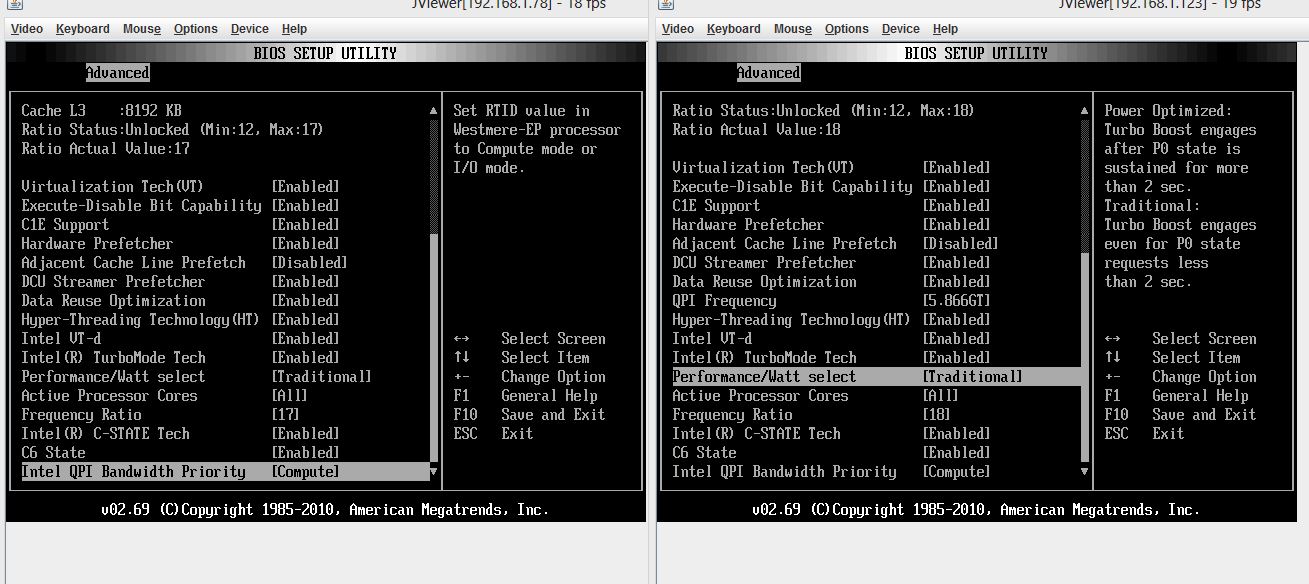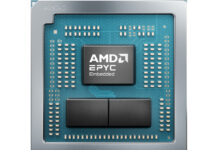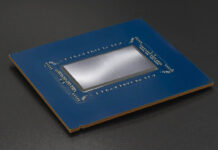Last week we looked at single and dual Intel Xeon L5520 benchmark configurations as today’s top value for a virtualization lab. Today we are looking at configurations with a bit more power, in the dual Intel Xeon L5530 and dual Intel Xeon L5630 benchmark comparison. The Intel Xeon L5530 runs at a faster speed (2.4GHz v 2.26GHz) and has Turbo Boost. The Intel Xeon L5630 has a lower TDP (40w v. 60w) and adds features such as AES-NI acceleration while dropping to 2.13Ghz base clock plus Turbo boost. For comparison, the Intel Xeon L5520 chips are around $35 on ebay while the Intel Xeon L5530 chips are around $170 on ebay and the L5630 chips run about $200. Let’s see how they compare in our Linux benchmark suite and against the cloud servers we have been testing from Amazon AWS and Rackspace.
Test Configuration
To test the Intel Xeon L5630 and L5530 we ended up using a HP DL180 G6 (recently reviewed here) which came with two Intel Xeon L5630 CPUs for about $550. This is a departure from our original plan to use the Dell PowerEdge C6100 but we saw a large anomaly in results. Our results for the L5520 and L5530 configurations were almost exactly the same. We quadruple checked BIOS settings as can be seen below, and even swapped the CPUs into different nodes:
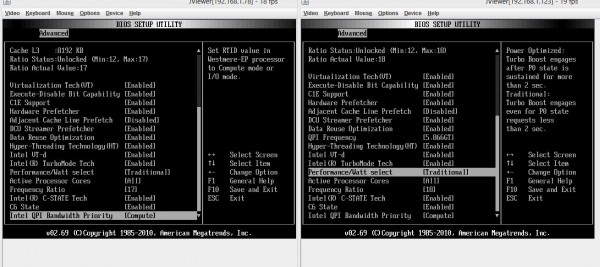
We also made a 4x speed video of a few side-by-side (manually run) benchmark runs of what we were seeing in the Dell C6100 with both the Intel Xeon L5520 and L5530 because they were that similar.
httpv://youtu.be/_MeETpIM5WQ
Something is clearly causing results we would not expect there. We next tried the HP DL180 G6 and everything worked as expected, hence the change. The HP DL180 G6 we ended up using had the following configuration:
- CPU: Dual Intel Xeon L5530 or Xeon L5630
- Memory: 24GB DDR3 1333MHz (6x 4GB RDIMMs)
- OS drive: Samsung 840 Pro 256GB SSD
- OS: Ubuntu Server 12.04 LTS
Time for the numbers!
Intel Xeon L5530 v. L5630 v. Cloud Benchmarks
We are utilizing our new Linux benchmark suite and Ubuntu Server 12.04 LTS to take a look specifically at the compute performance of these instances. We now have a fairly broad range of Amazon and Rackspace cloud instances benchmarked along with many dedicated platforms. One may see data bars where there is no system sitting at the maximum value. This is because we tend to benchmark ahead of publication so there are many dedicated platforms benchmarked but not published yet.
Hardinfo Performance
hardinfo is a well known Linux benchmark that has been around for years. It tests a number of CPU performance aspects.

As one can see, both the Intel Xeon L5530 and Intel Xeon L5630 CPUs are generally showing a performance improvement from the Intel Xeon L5520. One should also remember that the Xeon L5630 is a 40w TDP part.
UnixBench 5.1.3 Performance
UnixBench may be a defacto standard for Linux benchmarking these days. There are two main versions, one that tests single CPU performance on that tests multiple CPU performance. UnixBench segments these results. We run both sets of CPU tests. Here are the single threaded results:
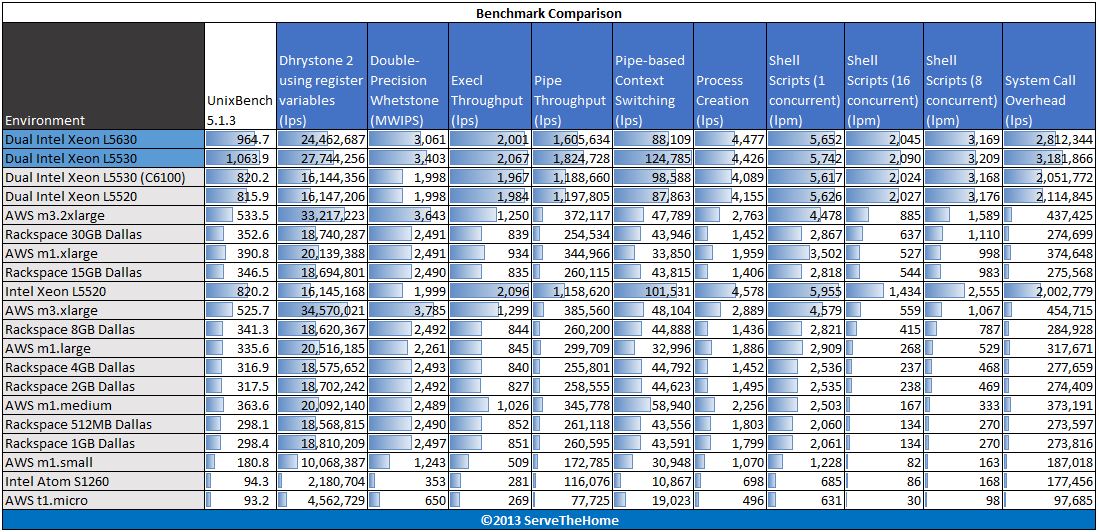
Again, one can see the clock speed advantage clearly with the Intel Xeon L5530. One can also see just how close the Dell C6100 results were with the L5530 and L5520. Here are the Multi-threaded benchmarks:
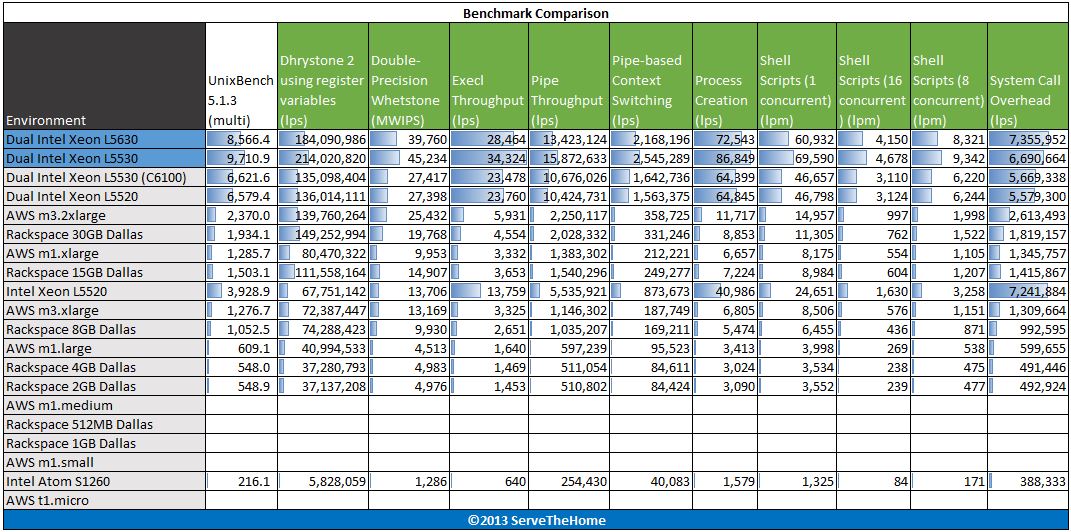
In the multi-threaded tests, the Intel Xeon L5530 does pull away in several tests as we would expect.
c-ray 1.1 Performance
c-ray is a very interesting ray tracing benchmark. It provides both consistent results and some clear separation. Ray tracing is generally a great multithreaded CPU benchmark. For this test we use both a simple 7500×3500 render and a more complex 1920×1200 render. Here are the results:

c-ray was providing results that we did not expect. The chips in the Dell C6100 are performing worse than we would have expected. This is especially strange given we previously saw scaling that made sense in the platform. Either way, we see the scaling we would expect from the Intel Xeon L5530 an L5630. More investigation is needed in terms of the 1920×1200 render we are using and the Xeon L5520.
Crafty Chess Performance
Crafty is a well known chess benchmark. It is also one where we saw issues last time with the Phoronix Test Suite and running on ARM CPUs. Here are the Crafty Chess results from simply running “crafty bench”:

Again, unlike what we saw in UnixBench, there is something clearly strange going on with the Dell C6100 results here.
Phoronix Test Suite Performance
We are using four tests from the Phoronix Test Suite: pts/stream, pts/compress-7zip, pts/openssl and pts/pybench.
- STREAM by John D. McCalpin, Ph.D. is a very well known memory benchmark benchmark. S
- 7-zip compression benchmarks were a mainstay in our Windows suite so we are including it again on the Linux side as a compression benchmark.
- The pts/openssl benchmark is very dependent on the CPU architecture being used
- Python is a widely used scripting language and pyBench is a nice single-threaded Python benchmark.
Here are the results of the Phoronix Test Suite benchmarks:

Interestingly enough here, we see stream benchmark results between the Intel Xeon 5500 series chips that are in-line with what we would expect to see, but there seems to be a bit more variability than we would expect in the pybench and openssl tests.
Conclusion
Although the Intel Xeon L5520 is a solid processor, it is certainly not the fastest. At under $35 on ebay and with reasonable power consumption, they are still going to meet the needs of most applications. In the Dell C6100, with what we have seen thus far, those are the chips to get. When looking at dual Intel Xeon L5530 configurations we see a clear advantage to higher clock speeds. In single threaded benchmarks, they performed very well. The dual Intel Xeon L5630 configuration came in about 21w lower in max power consumption than the dual Intel Xeon L5530 configuration in the HP DL180 G6. That is probably enough to steer many users to the dual Intel Xeon L5630 processors, especially with their AES-NI acceleration. The big advantage of the Xeon “L” series CPUs is that they have low enough power consumption to still be viable solutions today. Both chips show advantages. The big question for many users is that with the Intel Xeon L5530 running about $200 and the Intel Xeon L5630 also running about $200 each, which CPU makes sense. For the Dell C6100, we may need to do some more verification regarding what is going on so there the L5520 at sub $35 on ebay makes sense. We started a thread here for that activity. For other servers, the fact that the Intel Xeon L5630 has AES-NI and lower power consumption will steer many users that direction, despite the clock speed advantage of the Intel Xeon L5530.

